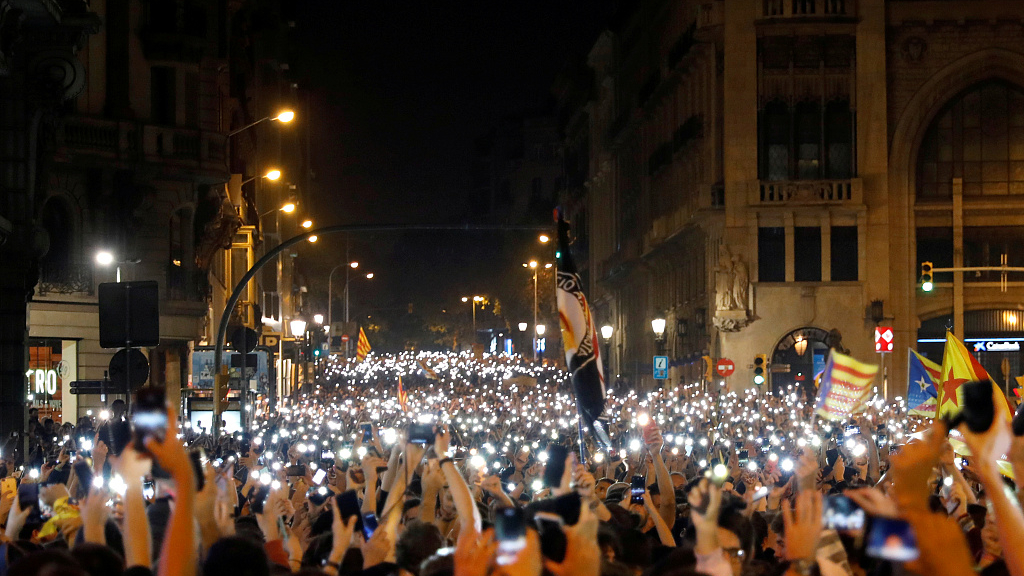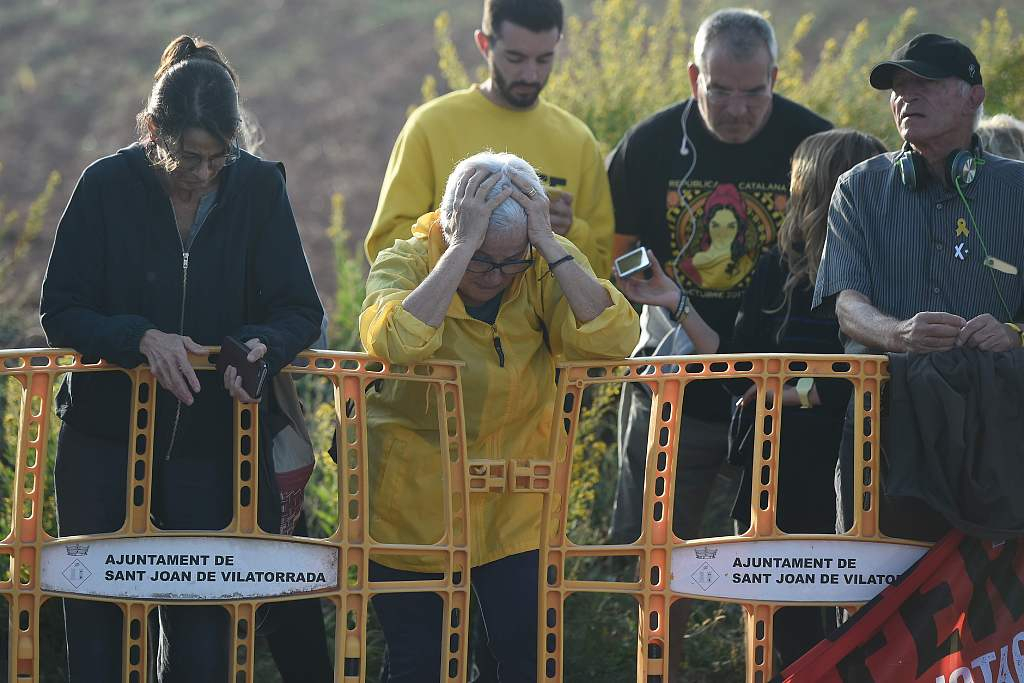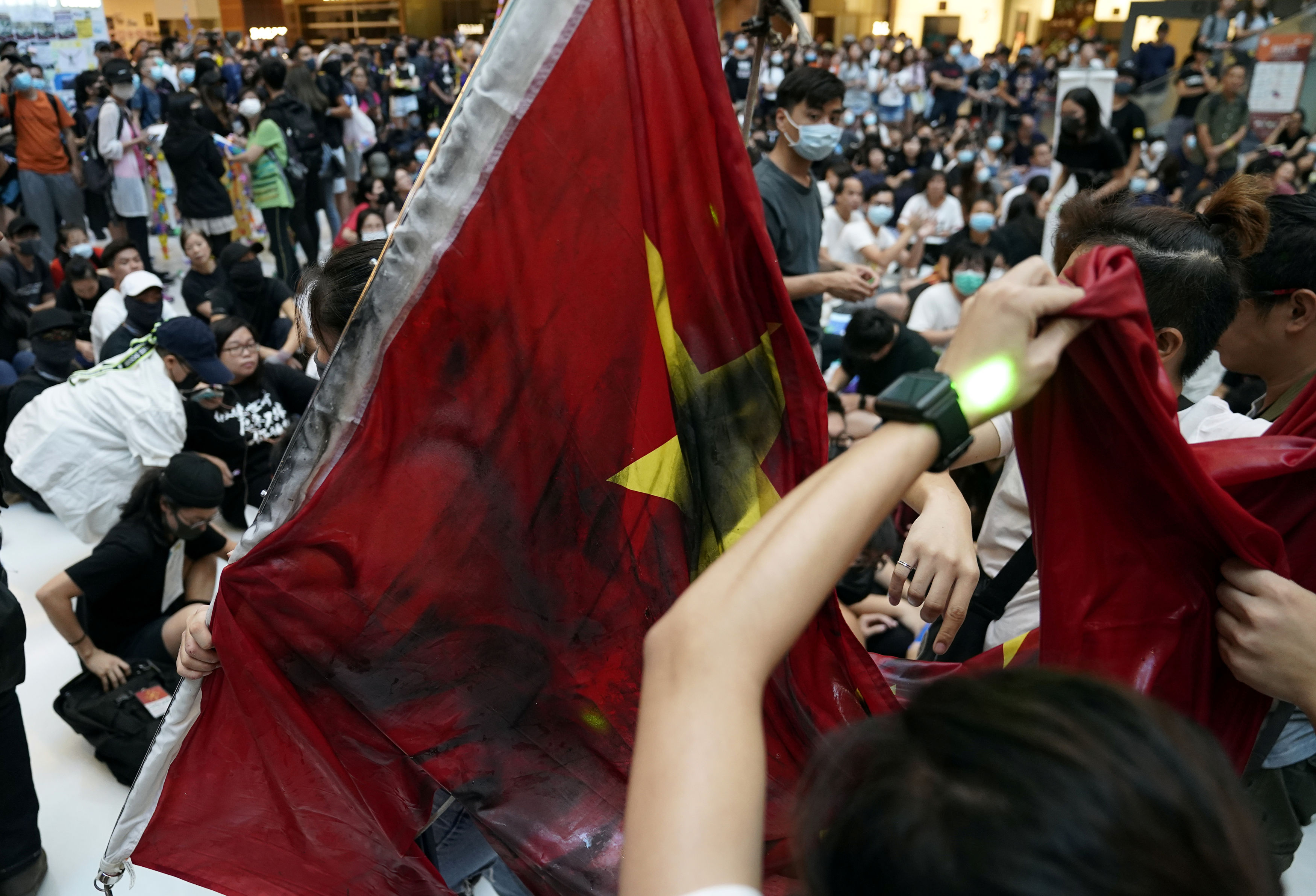
Demonstrators hold up their phones during a protest after a verdict in a trial over a banned independence referendum, in Barcelona, Spain, October 14, 2019. /VCG Photo
Demonstrators hold up their phones during a protest after a verdict in a trial over a banned independence referendum, in Barcelona, Spain, October 14, 2019. /VCG Photo
Editor's note: Adam Garrie is the director of the UK-based global policy and analysis think tank Eurasia Future and co-host of the talk show "The History Boys." The article reflects the author's opinions, and not necessarily the views of CGTN.
For the second time in two years, Catalonia is witnessing street agitations after the Spanish government handed down lengthy prison sentences to politicians who lead the Catalan independence movement. Scenes of self-evidently harsh police tactics against protesters have subsequently circulated online and on some European television screens.
The issue of Catalan independence is one that has never been far from the heart of Iberian politics for a combination of historical, cultural and economic reasons. Catalonia's grievances against Madrid are, in a legal sense, a wholly internal matter. The same is true of Hong Kong. Hong Kong is not a disputed territory, but one which incidentally has arguably far more autonomy within China than Catalonia does within Spain.
For obvious enough reasons, both the riots in Hong Kong and more recent developments in Catalonia are making international news, but thus far, major Western media outlets have reported the stories in very different ways.
By objective standards, Spain has been consistent in its treatment of separatist political leaders from Catalonia. The combination of public humiliation of Catalan officials, formal disqualifications from holding office, and lengthy prison sentences have made pro-independence Catalans feel supremely agitated. As Madrid has never given way to Catalan agitators, this is unlikely to change. Incidentally, both conservative and socialist-led Spanish governments have taken a remarkably similar line against Catalan separatists.

People react outside Ledoners prison where Catalan leader Oriol Junqueras was jailed, after Spain's Supreme Court sentenced nine Catalan leaders to prison, Barcelona, Spain, October 14, 2019. /VCG Photo
People react outside Ledoners prison where Catalan leader Oriol Junqueras was jailed, after Spain's Supreme Court sentenced nine Catalan leaders to prison, Barcelona, Spain, October 14, 2019. /VCG Photo
In Hong Kong, one sees an inverse issue. No one in Beijing nor in Hong Kong's autonomous legislature has proposed a reduction in Hong Kong's autonomous status under the "one country, two systems" for governance. By contrast, Madrid has, in the recent past, suspended the sittings of the autonomous parliament in Barcelona.
Another difference is that whilst Madrid is not giving any way in terms of heeding the grievances of the Catalan demonstrators, Hong Kong's assembly has, in fact, killed off the proposed fugitive bill that was the self-described original catalyst for protests in the early summer.
And yet, in Hong Kong, once the demand of the protesters was met, the situation quickly escalated into full-scale riots even though logic would dictate that the opposite ought to have happened. The rioters continue to target civilians, government property, the police, private property, and train stations throughout Hong Kong.
Dangerous weapons have been found on the Hong Kong rioters whilst some of the ringleaders have been photographed with foreign political and diplomatic officials – thus suggesting highly irresponsible and unlawful foreign interference into China's internal security and development.
By contrast, the international community, including the European Union, has remained largely silent on the Catalan issue in spite of the fact that the protests continue to be carried out by unarmed and primarily peaceful demonstrators.

Radical protesters damaged the national flag in a shopping mall in Sha Tin, Hong Kong Special Administrative Region, China, September 22, 2019. /Reuters Photo
Radical protesters damaged the national flag in a shopping mall in Sha Tin, Hong Kong Special Administrative Region, China, September 22, 2019. /Reuters Photo
Meanwhile, Hong Kong's increasingly violent protesters are portrayed by Western media outlets as virtuous when no cause in the world could justify arson, assault, and in some cases, torture.
Ultimately, violence solves nothing in politics because, by definition, violence is the antithesis of a lawful political system. Because of this, it is highly irresponsible for international media outlets to portray riots through rose-tinted lenses. In reality, no riots are a positive development.
Many businesses in Hong Kong have suffered greatly from the riots whilst news about the closure of some of Catalonia's major tourist locations and internationally beloved sporting events due to events on the ground, is a grim testament to the fact that street agitations have uniformly negative economic consequences.
Both Catalonia and Hong Kong are major tourist destinations, and it would be truly shameful if events on the ground soured these well-earned positive reputations. With this in mind, it is reckless for external forces to encourage strife in either place. Instead, external observers ought to quietly encourage calm and respect for peace and dignity.
(If you want to contribute and have specific expertise, please contact us at opinions@cgtn.com.)